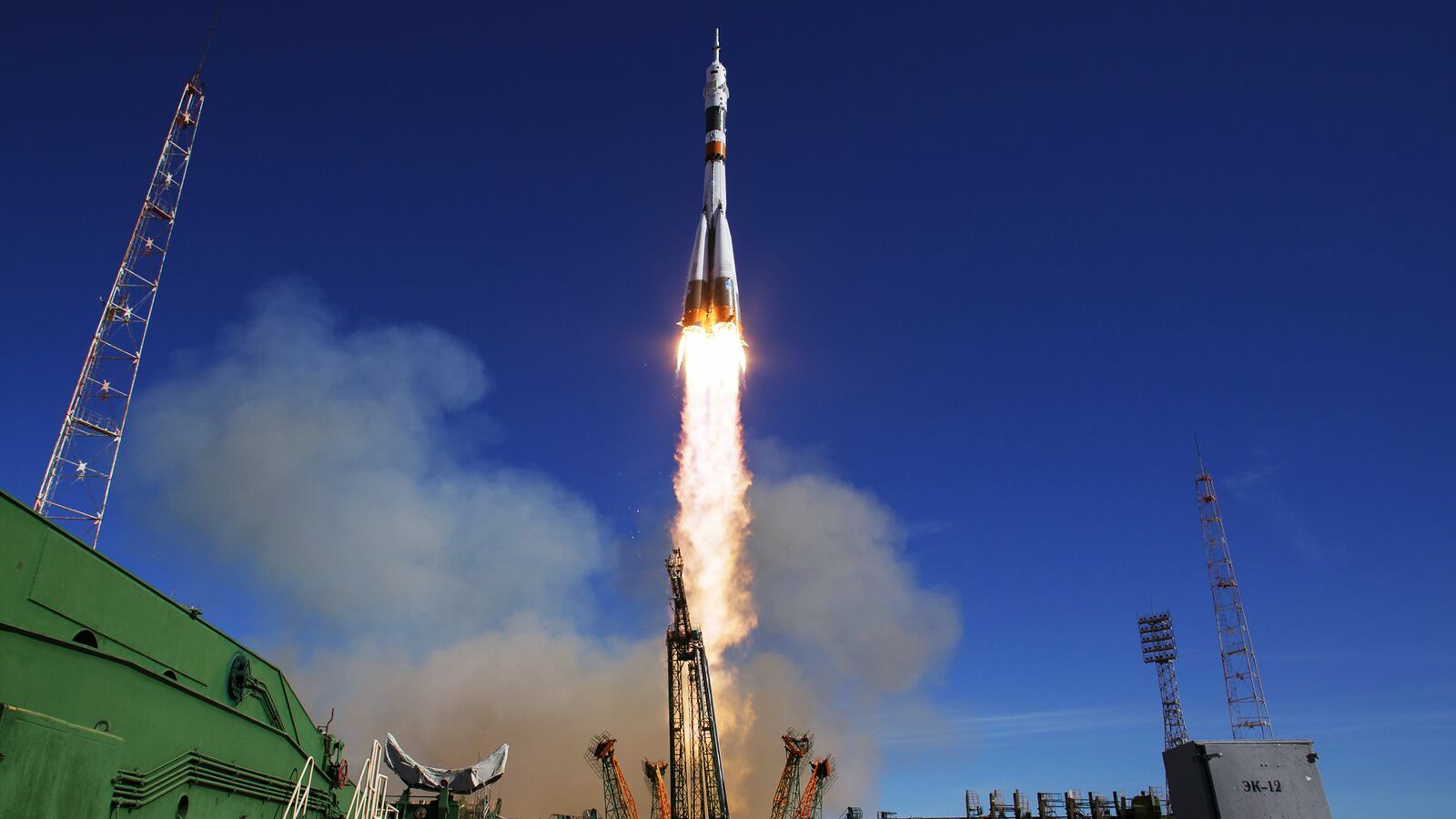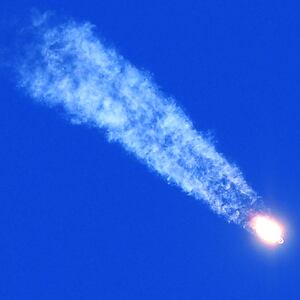Last week, a Russian rocket carrying two passengers from its launch site in Kazakhstan to the International Space Station—the Soyuz capsule—malfunctioned, forcing controllers on the ground to abort the launch and eject the vehicle's crew capsule.
The spacecraft split, arching back toward Kazakhstan, deploying its parachute. The two people on board, American astronaut Nick Hague and Russian cosmonaut Alexey Ovchinin, were unhurt.
The damage to the already-fragile reputation of the struggling Russian space industry—and to America and most of the rest of the world's access to space—are profound.

The incident also comes at a tense time for U.S.-Russian relations in space. NASA is developing a new moon-orbiting space station, and Russia wants a piece. But accidents like the aborted Soyuz add strain to a stressed relationship.
Russian authorities have halted manned launches pending an investigation. Ever since NASA retired its last space shuttle in 2011, the Soyuz system—1960s-vintage Russian capsules atop Russian rockets—has been the only ride into space for America and its allies. NASA reportedly pays $80 million per flight aboard Soyuz.
One country that doesn’t hitch a ride on Soyuz rockets is China. China operates human-rated capsules to support its own small space station, but strictly carrying only Chinese astronauts. No foreign government has partnered with Beijing in the same way the rest of the world's leading space powers collaborate on the International Space Station, owing to the heavily military nature of Chinese space operations and the planned 2019 decommissioning of Beijing's station.
But with the exception of the Chinese, we’re stuck on Earth. And the U.S.-Russian space partnership, one of the last venues of peaceful cooperation between the two powers, might never recover from the twin blows of the rocket failure and the discovery in late August of a hole in a separate Soyuz docked at the space station.
"We can and should worry," John Logsdon, founder of the Space Policy Institute at George Washington University, told The Daily Beast.
In the hours following the abortive launch, U.S. officials were quick to reassure the public. "A thorough investigation into the cause of the incident will be conducted," NASA administrator Jim Bridenstine tweeted.
"We have every confidence that our Russian colleagues will figure out what’s going on," Kenny Todd, one of NASA's space-station managers, told reporters.
Roscosmos, the Russian space agency, is running parallel investigations: one into the rocket failure, the other into the hole in the Soyuz that briefly leaked the space station's limited supply of breathable air. The hole is either the result of an undetected accident or error in the Soyuz's manufacture—or sabotage by someone on the ground or aboard the station.

Photo Credit: NASA HQ
Until investigations end, it's next to impossible for non-Chinese people to go to space. The six crew currently aboard the ISS—three Americans, a German, and two Russians—can safely leave the station by way of Soyuz capsules that are already docked at the station.
No new crew can take their place, however. NASA is developing two new human-rated capsules with SpaceX and Boeing, but the new spacecraft and their associated heavy rockets won't be ready until 2019. "There is basically nothing the United States can do until Boeing and SpaceX start flying crew next year," Logsdon said.
In light of Roscosmos's twin incidents, NASA might be reluctant to continue working closely with the Russians once its own new spacecraft are ready for flight. "Nothing is more important than the lives of the crew so it is logical that many people spend great energy on ensuring safety," Roger Launius, a former NASA historian, told The Daily Beast. "Any issue is treated very seriously."
It could turn out that someone tampered with the Soyuz in the August incident and that the capsule was perfectly safe.
Regardless, the Russian Soyuz’s seven-year-long near-monopoly on human spaceflight is ending. "The [October] emergency as well as the hole in previous Soyuz have damaged Russia's reputation hard," Pavel Luzin, a space expert at Perm University in Russia, told The Daily Beast.
The blow to Roscosmos's reputation has secondary effects. "Russia's space activity plays two political roles," Luzin explained. "In domestic politics it is a symbol of Russia's economic modernization and one of the sources of legitimacy for authoritarian political power."
Luzin’s reasoning suggests that as Russia's space prowess slips, so too does Russian president Vladimir Putin's power over his country.
Even before the Soyuz abort, Russia was desperate to shore up its position in international space programs. Beginning in 2022, NASA plans to operate a new $2.7 billion, moon-orbiting space station.
Where NASA leaned heavily on the Russians to help build and maintain the Earth-orbiting International Space Station—to the extent that Russian crew live and work in an entirely separate part of the station where the docking rings and fuel supply are located—the new Lunar Gateway station could deploy without any Russian involvement at all.
"Discussions regarding potential international Gateway contributions with international space agencies, including our International Space Station partners, are ongoing," Kathryn Hambleton, a NASA spokesperson, told The Daily Beast.
Sensing it might get cut out of the Lunar Gateway, in September Roscosmos threatened to build its own moon station. But it's an empty threat unless Moscow suddenly gets a lot richer and its space tech makes huge forward leaps. "Russia is not able to act in space separately," Luzin said.
Increasingly, Russia can't act in space cooperatively, either. Leaking capsules and crashing rockets have undermined the country's once-leading role in international space exploration. And while America can afford to develop its own spacecraft and space stations Russia can't. The more Russian space hardware fails, the less likely other countries are to work with the Russians.
In the short term, that holds back almost the whole world. In the longer term, its the Russian space industry that could find itself permanently grounded.






